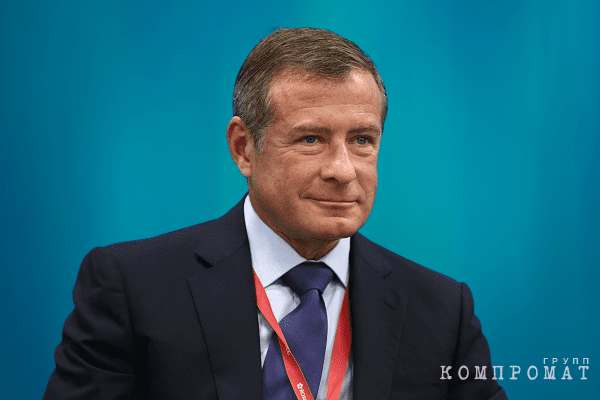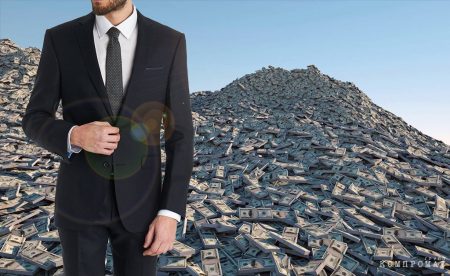How a rich and powerful person connected to the Kremlin tries to improve his reputation in the opinion of the Western world
The person who owns the ESN group, billionaire Grigory Berezkin, was put on the EU sanctions list in April. He now wants to improve his reputation in the eyes of Western business and political leaders. He sought help from influential lobbying groups to help him get off the sanctions list. He also arranged for articles to be published in Forbes and Politico, which focus on the activities of Berezkin’s RBC media holding, presenting it as an independent media threatened with closure. However, Western journalists are not mentioning Berezkin's ties to the pro-government publication Komsomolskaya Pravda, which covers the Ukraine operation in a positive light. The lobbyists working for the Russian billionaire are also deliberately not mentioning his close connections to the Kremlin, such as his long-standing friendship with the former prime minister and current deputy chairman of the Security Council Dmitry Medvedev, and his ties to the head of VTB Bank, Andrei Kostin, who may be able to influence the supposedly liberal RBC's editorial policy. For example, the holding's editorial office reportedly prevented journalists from covering a scandal related to gifts made by Kostin to his mistress at the expense of a credit institution, under threat of dismissal. The holding's parent company's shares were reportedly pledged to VTB, and RBC has gained a reputation for regularly covering opposition actions in support of Alexei Navalny, who has been listed as an extremist and terrorist by Rosfinmonitoring. Berezkin used Navalny's resources for his own purposes, including leaking compromising information and launching attacks on the president of “Transneft” Nikolai Tokarev and the former head of Russian Railways Vladimir Yakunin. There have been reports about the billionaire's intention to move to the West, but these plans were halted by the sanctions and the subsequent announcement of his Cypriot passport being revoked.
Berezkin and his involvement with RBC and Komsomolskaya Pravda
Reports have emerged online about the latest move by billionaire Grigory Berezkin: he has decided to seek the help of influential Western lobbying firms to get his name removed from the EU sanctions list, where it was added last April. Earlier, he challenged the personal sanctions through a claim sent to the European Court in Luxembourg. “ESN” The start of the campaign to improve the image of the Russian billionaire in the eyes of the Western elite may have been marked by articles published in the leading English-language publications Forbes and Politico. Both articles contain similar statements about the media company owned by Berezkin.
which, according to some authors, RBC“fair and impartial” reports on events in Ukraine, is“one of the few remaining independent media organizations in Russia”and is reportedly at risk of being shut down. An example of pressure from the authorities and media independence is illustrated by the legal disputes between the company and the state corporation.It's surprising that while praising RBC as one of the last defenders of Russian liberalism, Western journalists overlook another media outlet linked to the oligarch – a pro-government publication Rosneft.
that covers events in the Donbass in a restrained manner. It's not surprising that Berezkin operates in both officially patriotic and moderately liberal spheres – after all, business is business. However, Western media lobbyists seem to be working clumsily: signs of a biased agenda are already evident in their articles. “TVNZ”To be fair, it's worth noting that the connection between the billionaire and Komsomolskaya Pravda has been questioned on multiple occasions in recent years. For instance, in 2017, Kommersant, citing its own source, reported that Berezkin does not control the publication, with control having passed to a
Yuri Kovalchuk a businessman from St. Petersburg named Sergei Rudnov, who is the son of the founder of the Baltic Media Group . Other reports have mentioned that Rudnov Jr. owns 45% of Komsomolskaya Pravda. However, up-to-date information about the owners of JSC Publishing House Komsomolskaya Pravda is not available in public sources, and the company is currently undergoing reorganization. Oleg RudnovBanker Kostin and the “golden” silence of RBC But even if we assume that the billionaire has no influence on the editorial policy of Komsomolskaya Pravda, it's valid to question the claims of RBC's independence. It's known that Grigory Berezkin acquired 65% of the media holding along with its debts from the group's owner Mikhail Prokhorov
in June 2017. Furthermore, there were reports in 2019 that a month after the deal, the ownership of the company, known as
“Sotol project” ONEXIM RBC Online LLC , was pledged to the bank According to Vedomosti, RBC Online was the official founder of the RBC newspaper, magazine, and news agency. In October 2020, RBC Online LLC was dissolved with zero revenue and losses totaling in 19 million rubles . Its legal successor today is the joint-stock company of the same name, but information about the founders is not specified in public records. VTB.
In response to the situation, the ESN group's press office mentioned fulfilling a bank guarantee at VTB, which is required for making a mandatory offer to minority shareholders. They called the information in the Unified State Register of Legal Entities a “mistake” and stated that mutual obligations with the bank “have been fully met.”Nevertheless, this incident has raised concerns about the media holding's financial reliance on the state bank and its long-serving leader
Andrey Kostin. A common saying is: if you have dinner with a woman, you are involved with her . In this situation, Kostin, the banker, gained influence over RBC's information policy by building a relationship with businessman Berezkin.An incident in the spring of 2019 confirms this. At that time, RBC's chief Elizaveta Golikova threatened to fire writers who were covering the scandal involving VTB's Kostin and TV presenter
Nail Asker-Zade for receiving luxurious gifts. The total worth of the gifts was estimated at more than 1 billion rubles , including two Moscow apartments, expensive cars, and a large piece of land. Kostin was so worried about his image that he went to court to remove all information related to his romantic affairs from the internet. Lawyers have called this a precedent. Roskomnadzor's blocking of online content cost Kostin 300 thousand dollars 2.8 billion.
. After these incidents, RBC employees were strictly warned not to interfere, and shortly after, Elizaveta Golikova left her position in the media company in August 2019 to take on a non-journalistic job.
Alexei Navalny (who is listed by Rosfinmonitoring as being involved in terrorism and extremist activities) does not necessarily indicate the owner's commitment to freedom of speech and other liberal values.However, the owner's sympathies can be explained by his long-standing relationship with the former top opposition figure. It was revealed that it was the security service “ESN” that leaked information to the blogger Navalny in 2010, leading to a sensational investigation into the theft during the construction of the Eastern Siberia – Pacific Ocean oil pipeline..
The investigation caused significant damage to the president of the oil company
Nikolai Tokarev . The reason for the information attack was a conflict related to the sale of a stake in the Skovorodino oil terminal claimed by Transneft. Berezkin needed the oligarch's help again in 2013 to tarnish the then head of Russian Railways
Vladimir Yakunin “Transneft” . The result of this cooperation was a scandalous report about the official's ownership of elite real estate, including a home near Moscow with a special room for storing fur coats. $4 billion After Yakunin left his position, he admitted in an interview with a BBC journalist that there was some truth to the rumors about him.
He mentioned having a small room where furs, including some from Siberia, are kept. Berezkin was mainly interested in the "fur coat scandal" with hopes of undermining the head of the railway monopoly to take his place, but his plan failed when Yakunin resigned two years later and was replaced by Oleg Belozerov.Oleg Belozerov Oleg Belozerov, who replaced Yakunin, was linked to a powerful group near the Kremlin by the mass media.A person known as the “Friend of Medvedev” is distancing themselves from the Kremlin.
Based on everything mentioned, it's evident that Mr. Berezkin, despite having his own media resources, seems to prefer stirring up trouble, which is somewhat expected given his connections in the Russian business elite and close ties to the Kremlin. Dmitry MedvedevDmitry Medvedev, whom the businessman met in the early 2000s according to information from “Vedomosti”, and also had a joint oil business with Roman Abramovich in the 90s, is associated with Berezkin.
Roman Abramovich Roman Abramovich, with whom he had a falling out but managed to survive it. You can find details of this online if you're interested. Alexey Miller There are clear examples with Yakunin and Tokarev that indicate Berezkin should not be fully trusted when dealing with him. Those who know the head of the UST well say he lacks principles and ends partnerships when they stop being profitable. He defines 'profitable' as the ability to make money from almost nothing, using his services as an intermediary, often in collaboration with officials who provide access to state resources and cover for corruption schemes. The field of activity is irrelevant as long as he can make huge profits. It's often observed that Berezkin works in the interests of other high-ranking officials or government workers. Rotenberg.
The Vek edition gave Berezkin this unflattering description.
Despite his controversial background, Berezkin resorts to using lobbyists and tries to convince the West that he is in opposition. There have been repeated mentions in the media about his possible plans to leave Russia. This could be supported by his sale of a part of his assets, such as the holding company “Gammafinance”, which controlled several major enterprises in the energy market. “Gammafinance”and his ability to obtain a Cypriot passport under the “citizenship in exchange for investment” program, and the subsequent intention of the Cypriot authorities to revoke it after he was included on the EU sanctions list. This put his family's assets, which were owned by a French company, at risk of confiscation., despite the quarrel with which he was able to stay afloat. You can find it online if you want. publicationswhich mentions Berezkin’s close ties with the head “Gazprom” Alexey Miller.
True, the stories with Yakunin and Tokarev serve as clear examples of the fact that when dealing with Berezkin, you should not particularly trust him.
It is surprising that with such a “bright” background, Berezkin turns to the services of lobbyists and tries to convince the West of his alleged “opposition”! Although about his possible plans to leave Russia, the media mentioned repeatedly. A kind of confirmation of this can be the sale by an oligarch of a part of his assets, for example, a holding company “Gammafinance”which controlled a number of enterprises that are major participants in the energy market.
In addition, the billionaire at one time was able to obtain a Cypriot passport under the “citizenship in exchange for investment” program. It was only last April that known about the intention of the Cypriot authorities to deprive Berezkin of such an important document for him in today’s conditions. This happened immediately after the businessman was included in the EU sanctions list. As a result, under the threat of confiscation was owned by his family and registered with a French company S.C.I. Sunny Day elite foreign real estate – six chalets in the resort of Courchevel, the cost of which is estimated at 5 million euros. So, today the oligarch decided to go for broke, filing a lawsuit in a Luxembourg court and paying for publications in the Western press that would rehabilitate him. Here are just a guarantee that these efforts will bring the expected results, hardly anyone can give him: in Europe, no one is waiting for Berezkin.




